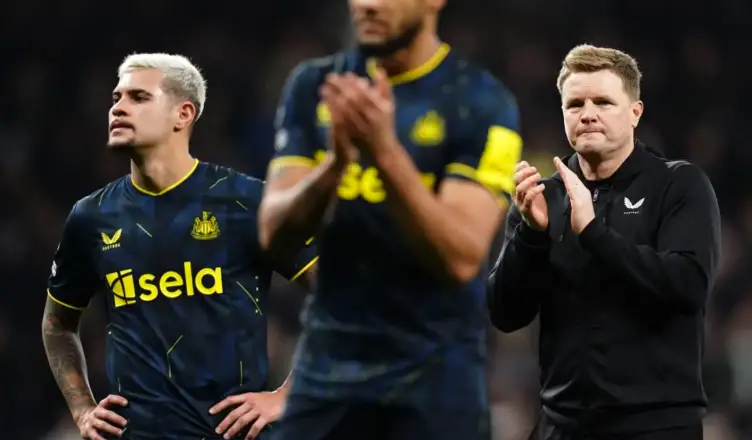The last few days have been terrible. To lose successive away matches by an aggregate score of 7-1 isn’t great for any team, especially one that is competing to retain its Champions League status for next season.
Like the majority, I didn’t really want to completely attribute the performance to fatigue, as we have been poor on the road all season. Or at least, our results on the road have been poor all season. It was too simplistic and convenient to blame the last three away defeats on fatigue solely.
However, after looking at the underlying numbers, it becomes very clear that although our performances are worse away from home, the difference isn’t as stark as our results suggest. People may or may not like football data. It isn’t for everyone, but as fans we can become driven by result and recency bias. It is easier to remember the last two away games and think back to the 3-1 loss to Brighton and think we were just as bad that day.
Fortunately data is data and it doesn’t change over time. There is no bias in the data and that is why it is useful to reflect on it at this point in time. Below shows some key performance indicators both home and away.
It is clear that there is a big differential between our home performances and away performances when it comes to conceding chances. We concede just over three more shots on average when we play away from home. It is normal for every team to be a little worse on the road, due to the crowd and the travel.
At St James’ Park, we believe we can beat anyone and the way the crowd roars for simple actions early in a game helps the players start with vigour. It is also an atmosphere that intimidates opposition teams. This coupled with our high pressing, high energy style of play makes it very difficult for opposition teams. That same environment isn’t created on the road and opposition teams can play freer.
Comparing the home and away metrics doesn’t really tell us a lot about the recent performances. However, below, we compare the first five away games (Man City, Brighton, Sheff Utd, Wolves and West Ham) with the last three (Bournemouth, Everton, Tottenham). Here is where the most interesting statistical takeaways appear.
In the first five away matches, we only managed to take five points, but we were competitive in every game. The Sheffield United game may skew some of the attacking numbers, but we created more than 2 xG in both of the Wolves and West Ham matches. If those matches played out the same way again, the majority of times, we would take at least four points, possibly six.
West Ham only managed five shots against us and their opening goal came from a defensive error, while their equaliser came from range. It was very unlucky for us not to take three points on that day.
In both the Brighton and Manchester City games, we were competitive, even if we weren’t the better team on the day. Both games had a minimal xG difference between the two teams. The Wolves game was a difficult one, but we still managed to create the better chances. We were unlucky to only get five points from those matches.
Our defence is conceding almost double the amount of shots on average, with the opposition averaging over 20 a game. That is relegation defending away from home and it isn’t something that has been the case for the last 18 months until the injuries have taken hold.
However, the performances in the last three have been so different to the performances of the first five. It can only be explained by the injury crisis and fatigue. Our style of play is intense and we encourage players to cover large spaces in transition. It needs midfielders to be alert and able to track third man runs between the lines. Usually, we have the athleticism and work rate to do this, while ensuring the team isn’t wide open.
In the last three matches, that hasn’t been the case. Opposition players have regularly got in between the lines and created clear cut chances. That is reflected in the xGC, with it almost trebling in the last three matches.
I think game state is also important when it comes to our away form. If we had managed to get the first goal in either the Everton or Tottenham games, the fatigue may not have had as big of a role as it did. A goal can do wonders for a team and once you are one down, the fatigue becomes as mental as it does physical.
Although fatigue is clearly the biggest factor, it doesn’t excuse Eddie Howe totally of blame. It has been evident to anyone watching the team that the players are exhausted, yet he has continued to play the same team.
Nobody thinks Paul Dummett, Lewis Hall, Matt Ritchie or Emil Krafth are in our best eleven. However, they are all able to play a part in the Premier League. They would provide fresh legs and more importantly, it would ensure that those on the pitch are getting time to rest.
If Howe could go back and rotate more, even with his bare bones squad, I think he would. The last few weeks would have been an education for him and he will have learned a lot about management at the sharp end.
Regardless of whether Howe could have managed the injury crisis better or not, the fatigue was always going to catch up with us at some point. The poor away results this season make for a nice distraction, but when you look deeper at the performances, fatigue is to blame for the recent defeats to Bournemouth, Everton and Tottenham.
We may have lost the matches with a fully fit squad, but the performances are unrecognisable from the team we have come to know. Fatigue is to blame.







Know the injuries have killed us but one of the biggest killers are the injuries to the defence since start of last season when Pope Schar Trippier Botman Burn have played only lost 4 games in total when them five have played together
Darren Bebb(Quote)